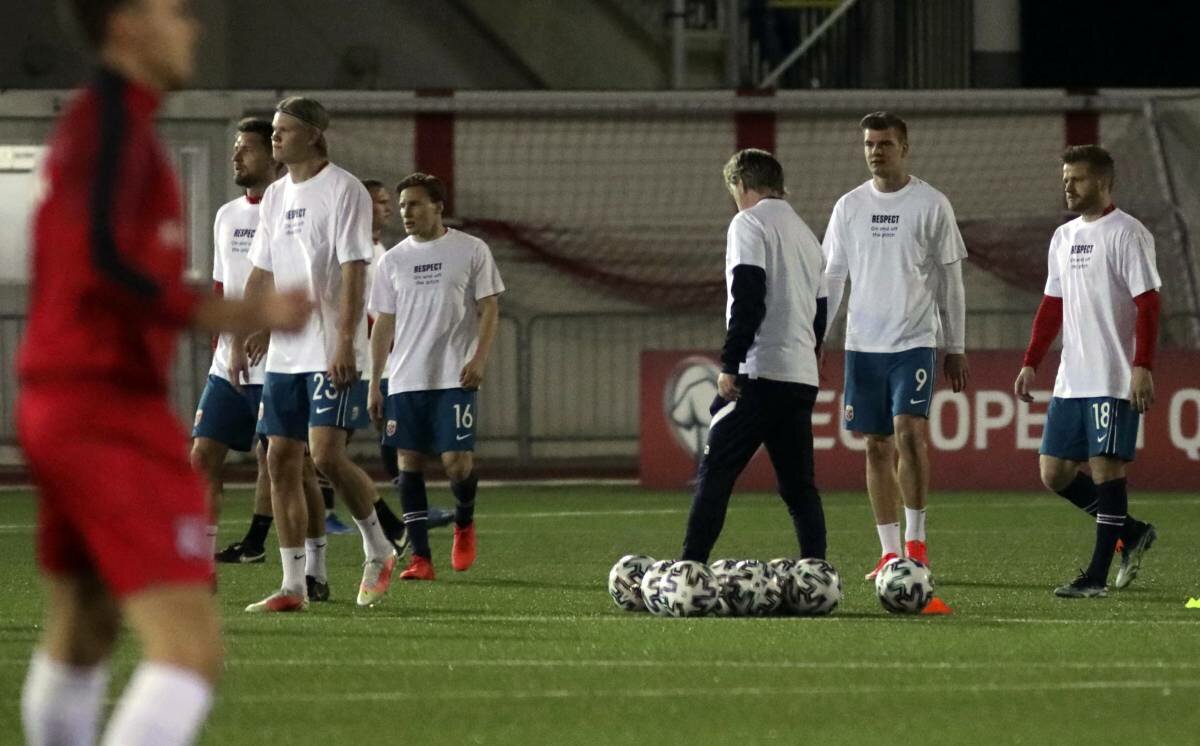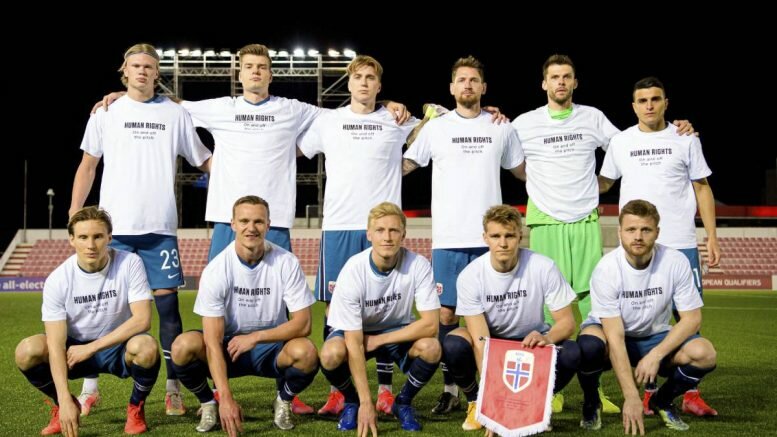Last Wednesday – March 24, 2021 – the Norwegian national football team beat Gibraltar 3-0 in their Group G Qualifying match for the upcoming 2022 World Cup in Qatar. Before the match, the Norwegian players adorned t-shirts bearing slogans in support of human rights. Now Germany and the Netherlands have joined the movement, with the sporting and political world surely taking note.
Norway v Gibraltar
Norway faced Gibraltar in their opening FIFA World Cup, Group G qualifying match, winning 3-0. During the warm-up for the match, the Norwegian players sported t-shirts with the message, “human rights – on and off the pitch.”
The upcoming World Cup will be hosted in Qatar, and the Norwegian action was designed to both express dissatisfaction and concern over Qatar’s human rights record, and to apply pressure to FIFA to take some form of action on the issue.
FIFA, for its part, has stated that no disciplinary action would be taken in response, affirming its support of freedom of speech. This feels like a cheap attempt to retain some moral high ground, in light of a much bigger problem.
The phrase, “plaster over a crack in the wall,” springs to mind. The concerns stem from reports of human rights negligence and abuses in Qatar, especially emanating from a report by The Guardian, which highlighted the deaths of 6,500 migrant workers, including 37 that have been directly linked to the construction of purpose-built stadiums.
Germany follow suit
The German national football team followed Norway’s example. In their Group J qualifying match against Iceland, the German players displayed individual letters painted onto their pre-match outfits, collectively spelling out “Human Rights”.
This came on March 25 – one day after the Norwegian expression – clearly showing that the Norwegian players’ message resonated with the Germans and that they wanted to contribute to building momentum behind the cause. The German midfielder, Leon Goretzka, summarised Germany’s support, stating,
“We wrote the letters ourselves. We have a large reach and we can use it to set an example for the values we want to stand for. That was clear”.
Netherlands inspired
After the movement’s initiation by Norway, Dutch central defender Matthijs de Ligt expressed in a press conference that the players of the Netherlands would also be displaying similar messages before their qualification matches, in support of Norway and Germany, and in solidarity with the affected migrant workers.
Recognizing the plight of migrant workers in Qatar’s campaign of infrastructural construction for the World Cup, de Ligt stated that,
“It is very clear what is our position.“
And, true to his word, the Netherlands were supportive. Also in Group G with Norway, the Netherlands faced Latvia on Saturday, March 27, winning 2-0. Before the match, the Dutch players displayed the slogan, “Football Supports Change”.

Norwegians continue on path
At the same time as the Netherlands were playing against Lativa, Norway faced Turkey in their second qualifier. Unfortunately, Norway lost the match 0-3, but were still true to their ongoing campaign, re-iterating their original message in support of human rights.
Before the match against Turkey, Norwegian players promoted the same message as before, and this time called upon more countries to join. With the initial success, and household footballing nations now on board, there are promising signs that this message could gain serious traction.
The Norwegian players also raised their hands into what appeared to be a representation of the number 5. Speculation has arisen that this may be in reference to Article 5 of the Equality and Human Rights Commission – the right to liberty and security.
While the Equality and Human Rights Commission is designed to uphold human rights within the United Kingdom, its article 5 does match article 5 of the European Convention on Human Rights, which also protects the right to liberty and security.
However, this interpretation may be misguided, since article 4 of the European Convention is far more applicable as a right, to this situation. Article 4 enshrines the prohibition on slavery and forced labor. Another interpretation may be that the number 5 is in reference to article 5 of the International Covenant on Civil and Political Rights, which stresses that,
“Nothing in the present Covenant may be interpreted as implying for any State, group or person any right to engage in any activity or perform any act aimed at the destruction of any of the rights and freedoms recognized herein.”
Whatever the number 5 hand gesture was symbolic of, the Norwegians show no sign of slowing down in their ongoing campaign.
Norway as a humanitarian leader
Norway has a proud position as a humanitarian force in the world. Along with helping to facilitate the Oslo Accords – an attempt to open dialogue and broker peaceful negotiations between the State of Israel and the Palestinian Liberation Organization – Norway also boasts many humanitarian institutions with operations in its capital city.
These include the Red Cross, The Norwegian Center for Human Rights, The Nobel Peace Institute, and the University of Oslo, which provides and produces world-class education and research in the fields of International Humanitarian and Human Rights Law.
These components all contribute to an ongoing national humanitarian strategy.
Clear intentions off the pitch; mixed fortunes on
Unfortunately, from a footballing perspective, Noway’s efforts haven’t been as potent. With one win and one defeat, qualifying for the World Cup will be a severe uphill struggle, especially in a group shared with the Netherlands, Turkey, and Montenegro, all of whom have looked strong early.
That being said, with Norway potentially inducing a boycott of the World Cup, the players can be satisfied that their efforts to improve the lives of human beings across the world, can be considered as an achievement that will surely surpass sporting glory.
This can be a moment in history, a chance to do the right thing, and the adoption of such a stance is something that cannot ever be taken away from the players, and those in support.
The opinions expressed are those of the author and are not held by Norway Today unless specifically stated.
Source: #Norway Today
Do you have a news tip for Norway Today? We want to hear it. Get in touch at info@norwaytoday.no






Be the first to comment on "Norway’s national football team: Humanitarian trend-setters"